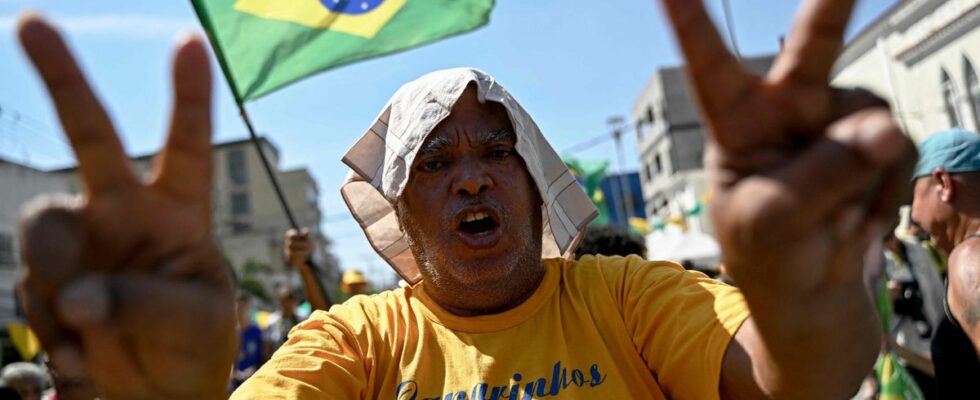Brazil, where the far-right president Jair Bolsonaro is seeking a second term on Sunday against the icon of the left, ex-president Lula, favorite in the polls, is a continent country, a major exporter of raw materials, marked by glaring inequalities. Its approximately 215 million inhabitants are hit hard by the relative weakness of the economy, inflation and hunger for 33 million of them. Unemployment now affects 9.5 million people (-6.2% compared to the second quarter), according to the Brazilian Institute of Statistics (IBGE) which has just published its latest figures. 20 minutes paints a portrait of the country, which is playing its all out on Sunday in a poll that promises to be tight.
One of the biggest countries in the world
Brazil extends over 7,400 km of coastline along the Atlantic. It shares borders with almost all the countries of the South American continent (except Chile and Ecuador), of which it is the only Portuguese-speaking country. It is the fifth largest country (8.5 million km2), with an estimated population of 215 million. It is home to more than 60% of the Amazon rainforest, essential in preserving the planet’s climate.
Brazil is the largest Catholic country in the world. Evangelical Protestants represent a third of the population.
Monarchy, dictatorship and democracy
A former Portuguese colony, Brazil became an independent monarchy in 1822 and a Republic in 1889. Slavery was abolished in 1888. The country experienced a military dictatorship from 1964 to 1985. In 2003, Luiz Inacio Lula da Silva, “Lula”, of the Workers’ Party (PT) becomes the first left-wing president since the return to democracy after the military dictatorship (1964-1985). He was re-elected in 2006.
With its social programs, 29 million Brazilians come out of poverty. His runner-up Dilma Rousseff, the first woman elected president (2010 and 2014), was dismissed in 2016, accused of having made up the public accounts.
In 2018, Brazil swung to the far right, with the election of Jair Bolsonaro. Covid-skeptical president in the second most bereaved country in the world by the pandemic (687,000 dead), he multiplies misogynistic slippages or against indigenous populations. It supports mining and agriculture in the Amazon, which has been ravaged by fires and deforestation. He is the subject of more than 150 impeachment requests and a misinformation investigation.
He faces Sunday at the polls Lula, who after eighteen months of imprisonment regained his political rights in 2021, with the cancellation of his convictions in a huge case of suspicion of corruption.
Largest economy in Latin America
The continent’s largest economy, Brazil relies on abundant natural resources and a dynamic agri-food sector. It is one of the world’s leading producers and exporters of coffee, sugar, orange juice, ethanol, iron ore, corn, soybeans, cotton, beef and poultry.
In 2021, it returned to growth with a rebound of 4.6% of GDP, after a contraction of 3.9% in 2020 due to the coronavirus. However, it experiences high inflation and unemployment. The Rio carnival, popular with tourists from around the world, resumed in April 2022 after a two-year hiatus.
Violence and inequality
With 47,503 homicides in 2021 (-6.5%), Brazil remains one of the most violent countries (one fifth of global intentional homicides). In 2021, the NGO Security Forum counted a rape every ten minutes.
The pandemic has widened already abysmal inequalities in Brazil, which is home to thousands of “favelas” (slums). The poverty rate (less than $5.50 a day) jumped from 24% to 30% between 2014 and 2022, according to the Getulio Vargas Foundation. Hunger has increased by 73% since 2020, affecting 33.1 million Brazilians, according to the Brazilian Food Sovereignty and Security Research Network. The number of children aged 6 and 7 who cannot read or write has jumped by 66%, after a long closure of schools, according to the association Todos Pela Educação (all for education).
Football and bossa nova
Brazil is a great football country, the only one to have won the World Cup five times (1958, 1962, 1970, 1994, 2002). Among the stars of the round ball are notably the “king” Pelé and Neymar. It is also distinguished by a musical abundance, from samba to funk via bossa nova and jazz.
Among its world famous musicians, Chico Buarque, Caetano Veloso, Gilberto Gil, or more recently the funk singer Anitta, the first Brazilian to climb to the top of the Spotify charts.
Other renowned Brazilians, the architect Oscar Niemeyer (1907-2012), father of the futuristic capital Brasilia, or the photographer Sebastiao Salgado.

